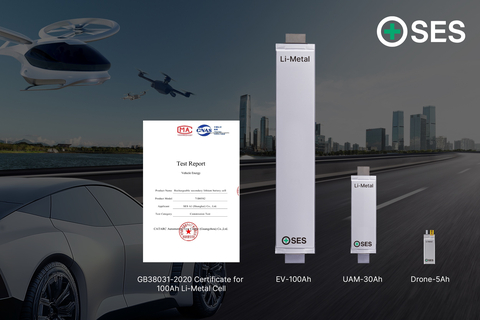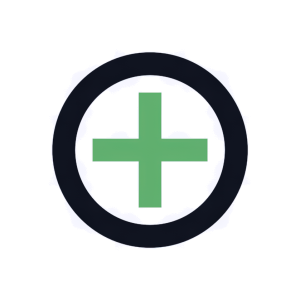SES AI’s 100 Ah Li-Metal Is First to Successfully Pass the Global Electric Vehicle EV Safety Standard Test GB38031-2020
- First 100 Ah Li-Metal Automotive Cell to Pass for EV and UAM
- Bolsters Commercialization Momentum

First 100 Ah Li-Metal Automotive Cell to Pass for EV and UAM (Graphic: Business Wire)
GB38031-2020 is a mandatory national standard in the world’s largest EV market,
“The results are highly encouraging, affirming our decade-long commitment to refining Li-Metal chemistry and enhancing the safety of Li-Metal batteries,” said Qichao Hu, Founder and CEO of SES AI. “There are two types of safety tests that Li-Metal needs to pass for EV and UAM, abuse and in-use. For abuse tests, passing GB38031-2020 is a key milestone, it’s also the first time in the industry that a high energy density cell such as Li-Metal passes the rigorous safety tests of GB38031-2020. In addition, for in-use safety, our AI for Safety can predict and prevent almost
This announcement bolsters the commercialization momentum SES AI ignited earlier this year when it moved into the next phase of a JDA with Hyundai, making it the only Li-Metal battery company with two automotive B-sample agreements in progress. Building on this momentum, during the recent Q2 shareholder meeting, the Company unveiled its All-in-on-AI strategy, leveraging AI for Science, Manufacturing, and Safety to accelerate the commercialization of Li-Metal batteries.
About SES AI
SES AI Corp. (NYSE: SES) is powering the future of global electric transportation on land and in the air with the world’s most advanced Li-Metal batteries. SES AI is the first battery company in the world to accelerate its pace of innovation by utilizing superintelligent AI across the spectrum of its business, from research and development; materials sourcing; cell design; engineering and manufacturing; to battery health and safety monitoring. Founded in 2012, SES AI is an Li-Metal battery developer and manufacturer headquartered in
SES AI may use its website as a distribution channel of material company information. Financial and other important information regarding SES AI is routinely posted on and accessible through the Company’s website at www.ses.ai. Accordingly, investors should monitor this channel, in addition to following SES AI’s press releases, Securities and Exchange Commission filings and public conference calls and webcasts.
Forward-Looking Statements
This press release contains statements that SES AI believes are “forward-looking statements” within the meaning of the Private Securities Litigation Reform Act of 1995. These forward-looking statements include, without limitation, statements relating to expectations for future financial performance, business strategies or expectations for our business. These statements are based on the beliefs and assumptions of the management of SES AI. Although SES AI believes that its plans, intentions and expectations reflected in or suggested by these forward-looking statements are reasonable, it cannot provide assurance that it will achieve or realize these plans, intentions or expectations. These statements constitute projections, forecasts and forward-looking statements, and are not guarantees of performance. Such statements can be identified by the fact that they do not relate strictly to historical or current facts. When used in this press release, words such as “anticipate”, “believe”, “can”, “continue”, “could”, “estimate”, “expect”, “forecast”, “intend”, “may”, “might”, “plan”, “possible”, “potential”, “predict”, “project”, “seek”, “should”, “strive”, “target”, “will”, “would” and similar expressions may identify forward-looking statements, but the absence of these words does not mean that a statement is not forward-looking.
You should not place undue reliance on these forward-looking statements. Should one or more of a number of known and unknown risks and uncertainties materialize, or should any of SES AI’s assumptions prove incorrect, our actual results or performance may be materially different from those expressed or implied by these forward-looking statements. Some factors that could cause actual results to differ include, but are not limited to the following risks: risks related to the development and commercialization of SES AI’s battery technology and the timing and achievement of expected business milestones; risks relating to the uncertainty of achieving and maintaining profitability; risks relating to the uncertainty of meeting future capital requirements; the ability of SES to integrate its products into electric vehicles (“EVs”) and Urban Air Mobility (“UAM"), drones and other applications; the risk that delays in the pre-manufacturing development of SES AI’s battery cells could adversely affect SES AI’s business and prospects; the market for air mobility, and for use of Li-Metal technology in air mobility applications, is still emerging and may not achieve the growth potential we expect; risks relating to the development of the UAM market and demand for batteries from the UAM industry; potential supply chain difficulties; the ability of SES AI to engage target original equipment manufacturers (“OEMs”) customers successfully and integrate SES AI’s products into EVs manufactured by OEM customers; the ability to obtain raw materials, components or equipment through new or existing supply relationships; our use of artificial intelligence and machine learning may result in legal and regulatory risk; risks resulting from SES AI’s joint development agreements and other strategic alliances and investments; product liability and other potential litigation, regulation and legal compliance; SES AI’s ability to attract, train and retain highly skilled employees and key personnel; developments in alternative technology or other fossil fuel alternatives; risks related to SES AI’s intellectual property; business, regulatory, political, operational, financial and economic risks related to SES AI’s business operations outside
© 2024 SES AI Corp., Confidential and Proprietary
View source version on businesswire.com: https://www.businesswire.com/news/home/20240812117798/en/
For the media:
pr@ses.ai
For investors:
ir@ses.ai
Source: SES AI Corporation







